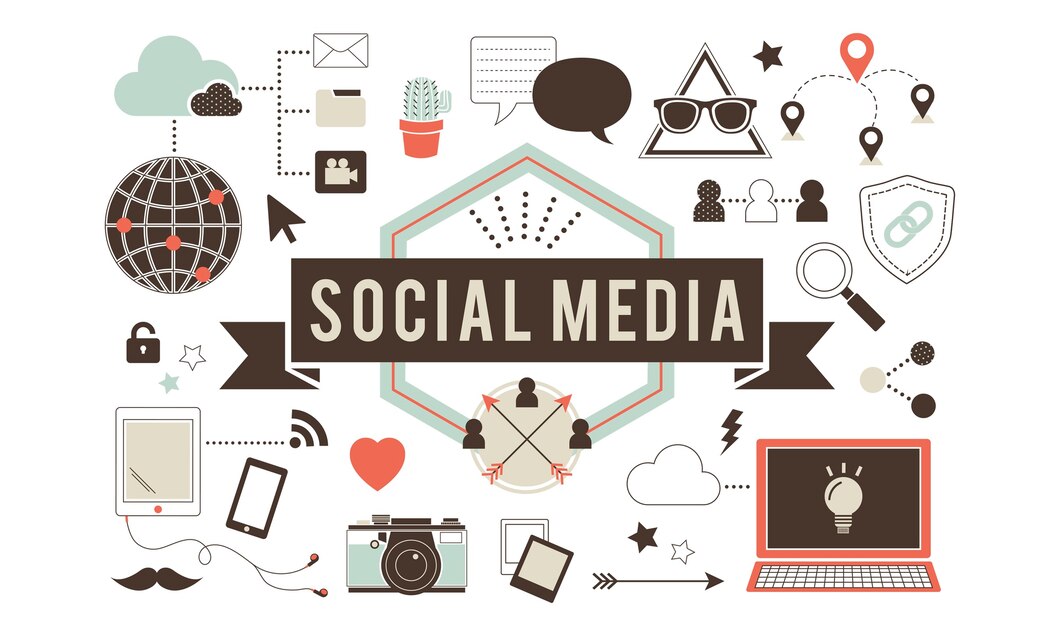Working Hours: Monday - Saturday, 10 AM - 7 PM
Blog Posted on 13 September, 2024 - 01:59 AM

The Social Media Revolution: How Platforms Are Shaping Our Daily Lives
In the past two decades, social media platforms have reshaped how we communicate, consume information, and connect with the world. What began as simple networking sites has evolved into complex ecosystems that influence personal relationships, business operations, political landscapes, and societal norms. Today, social media is an integral part of daily life, with billions of people worldwide using these platforms to share experiences, access news, and engage with brands.
This blog will explore the evolution of social media platforms, their impact on society and various industries, and the future trends that may shape the next generation of social media.
The Early Days of Social Media
The history of social media can be traced back to the late 1990s and early 2000s when the first social networking sites emerged. Platforms like Six Degrees (1997) and Friendster (2002) were among the pioneers, allowing users to create profiles and connect with friends. However, these early platforms were relatively basic compared to what we see today, and their user bases were limited.
It wasn’t until the launch of MySpace in 2003 that social media began to gain mainstream attention. MySpace offered more customization options, allowing users to personalize their profiles with music, backgrounds, and photos. Its rise in popularity set the stage for future social media giants.
In 2004, Facebook was born. Initially launched as a college networking site, it quickly expanded to include users worldwide. Facebook introduced a cleaner, more user-friendly interface, and its news feed feature became a game-changer, allowing users to stay updated on their friends' activities in real-time. This innovation paved the way for the platform to become the dominant force in social media for over a decade.
The Rise of Visual and Mobile Platforms
As smartphones became more ubiquitous, social media platforms evolved to meet the demands of a mobile-first world. Instagram, launched in 2010, focused on photo sharing and filters, appealing to users who wanted a visually-driven platform. Its rise was meteoric, and Facebook acquired it in 2012, recognizing the shift toward mobile-based social media.
Another major player in the visual social media space is Pinterest, launched in 2010. Unlike other platforms, Pinterest allows users to “pin” images and content onto virtual boards, making it a popular platform for inspiration, especially in areas like fashion, home decor, and cooking.
Snapchat, which launched in 2011, revolutionized how users share content by introducing disappearing photos and videos. This fleeting content format resonated with younger users, and Snapchat’s innovative features, like filters and stories, were quickly adopted by other platforms.
YouTube, while not a traditional social media platform, became a powerful player in visual content creation. Launched in 2005, it has grown into the world’s second-largest search engine, allowing users to upload, share, and monetize video content. The rise of video content across social media platforms has since exploded, with YouTube leading the way in video sharing and content creation.
The Impact of Social Media on Communication and Relationships
One of the most significant changes brought about by social media platforms is how we communicate. Traditional forms of communication, such as phone calls and letters, have been largely replaced by instant messaging, direct messaging (DMs), and social media interactions. Platforms like WhatsApp, Facebook Messenger, and WeChat have made it easier to stay connected with friends and family across the globe.
However, this shift in communication has also raised concerns about the quality of interactions. Critics argue that while social media enables constant connection, it may also contribute to more superficial relationships. Conversations are often brief and fragmented, lacking the depth of face-to-face interactions.
On the other hand, social media has allowed people to maintain connections that might have otherwise faded due to distance or time. It has made it easier to stay in touch with friends and family, even when they are far away, and to reconnect with people from the past.
The Business of Social Media
Social media platforms have become crucial tools for businesses of all sizes. From small startups to multinational corporations, businesses leverage social media to reach and engage with customers. The rise of digital marketing has transformed how companies advertise, shifting from traditional methods like print and television to online ads targeted through platforms like Facebook, Instagram, and LinkedIn.
Social media platforms offer businesses the ability to target specific demographics, interests, and behaviors with pinpoint accuracy. This targeted advertising has proven highly effective in driving brand awareness, generating leads, and increasing sales. Moreover, the interactive nature of social media allows companies to engage directly with customers, fostering brand loyalty and creating a community around their products or services.
Influencer marketing has also emerged as a powerful tool for brands. Social media influencers, who have large and engaged followings, often collaborate with companies to promote products and services. This form of marketing has proven particularly effective in industries like fashion, beauty, and fitness, where personal recommendations and authentic content resonate with consumers.
E-commerce has also found a home on social media platforms. Facebook Marketplace, Instagram Shopping, and Pinterest’s “Buyable Pins” have made it easier for users to discover and purchase products without leaving the app. This integration of shopping and social media has created new opportunities for businesses to reach customers in a more seamless and interactive way.
Social Media and the News Cycle
The role of social media in disseminating news has grown exponentially in recent years. Platforms like Twitter, Facebook, and Reddit have become go-to sources for breaking news, real-time updates, and public discourse. In many cases, social media users receive news faster than through traditional media outlets.
This democratization of information has its benefits, but it also comes with challenges. The spread of misinformation and fake news on social media has become a major concern. False or misleading content can quickly go viral, influencing public opinion and shaping political discourse. In response, social media platforms have implemented fact-checking mechanisms and content moderation policies to combat the spread of misinformation. However, the effectiveness of these measures remains a topic of debate.
Moreover, the algorithm-driven nature of social media can create echo chambers, where users are exposed only to information and viewpoints that align with their existing beliefs. This has contributed to the polarization of political and social issues, as users become less likely to encounter diverse perspectives.
The Dark Side of Social Media
While social media platforms offer numerous benefits, they also come with significant downsides. One of the most pressing concerns is the impact of social media on mental health. Studies have shown that excessive use of social media can lead to feelings of anxiety, depression, and loneliness, particularly among young people. The constant comparison to others, the pressure to maintain a curated online persona, and the fear of missing out (FOMO) can contribute to negative mental health outcomes.
Cyberbullying is another issue that has been exacerbated by social media. The anonymity of online platforms makes it easier for individuals to engage in harassment and bullying without facing consequences. Social media companies have implemented measures to combat cyberbullying, such as reporting tools and anti-bullying campaigns, but the problem persists.
Privacy concerns are also prevalent on social media. Many platforms collect vast amounts of data on their users, which is then used for targeted advertising. This data collection has raised concerns about user privacy and data security, particularly in light of high-profile data breaches and scandals like the Facebook-Cambridge Analytica incident.
The Future of Social Media Platforms
As social media platforms continue to evolve, several key trends are likely to shape their future. One of the most significant trends is the rise of short-form video content, popularized by platforms like TikTok and Instagram Reels. These platforms have capitalized on users’ preference for quick, engaging content, and this format is expected to remain dominant in the coming years.
Augmented reality (AR) and virtual reality (VR) are also expected to play a larger role in social media’s future. Platforms like Snapchat and Instagram have already introduced AR filters, and as AR and VR technologies advance, we can expect more immersive social media experiences. Facebook’s rebranding as Meta and its focus on the “metaverse” signals a potential shift toward virtual social spaces, where users can interact in 3D environments.
Another emerging trend is the increased focus on privacy and data security. In response to growing concerns about data privacy, platforms like Apple’s iOS 14 update have introduced more stringent privacy controls, giving users more control over their data. Social media platforms will need to adapt to these changes and ensure that they prioritize user privacy while still offering personalized experiences.
“The social media revolution is more than just connection—it's reshaping our daily lives, influencing how we communicate, consume, and create in a digital world.”
Conclusion
Social media platforms have come a long way since their inception, transforming from simple networking sites to complex ecosystems that influence nearly every aspect of modern life. They have revolutionized communication, reshaped the business landscape, and become integral to the way we access and share information.
However, as social media continues to evolve, it is essential to address the challenges it presents, from mental health concerns to privacy issues. As we look to the future, the next generation of social media platforms will need to balance innovation with responsibility, ensuring that they continue to connect people and foster positive interactions in an increasingly digital world.
Insightful Blogs
Discover insightful blogs that offer valuable perspectives, expert opinions, and engaging content on the latest trends and developments.
Get In Touch
With Us
We are headquartered in Kolkata, India. Send us your message and we shall get back to you soon.
Come and See the Future with Us
Let's make something great together. We are trusted by over 50+ clients. Join them by using our services and grow your business.




